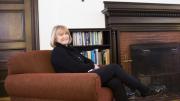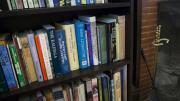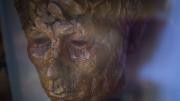“Seamus was not a show-off, but he was a performer,” said Loker professor of English emeritus and former Adams House master Robert Kiely; and there was “never a more loving and appreciative audience than he had here.”
Kiely was addressing an audience in the House dining hall on March 28, during an event that dedicated suite I-12 to the Irish poet Seamus Heaney, who taught at Harvard first as a visiting professor (in 1981), then as Boylston professor of rhetoric and oratory (1984-1995), and finally as Ralph Waldo Emerson Poet-in-Residence (until 2006); he died in August 2013. Heaney had a routine upon his arrival in Cambridge each year: settling into Adams House—“The arts and bohemia were represented there,” he told the Harvard Gazette in 2012; “It was a desired address”—and then off to the bookshops.
The afternoon included literary and musical performances, as well as stories from students, friends, and colleagues that evoked Heaney’s daily life at the University: a set of keys left in the lock; seeing him surrounded by admirers at House events; bringing baked goods to his door. This communal portrait-in-words seemed fitting for a Nobel Prize laureate called “one of the most human of poets” by current Adams master Sean Palfrey.
Short talks about Heaney’s work doubled as stories to anchor various objects in the suite. A rainstick was donated by Heaney’s bibliographer, Rand Brandes, who detailed the process of helping the poet organize his manuscripts and archives (the poem “The Rainstick” is dedicated to Brandes and his wife). Stark images of the Ulster landscape, displayed on the walls of the suite, were donated by photographer Rachel Giese Brown, who spoke about her collaboration with Heaney on an edition of his book Sweeney Astray.
Guests also gave readings of what could be called Heaney’s Harvard verses—the occasional poems written to celebrate the anniversaries of Adams House (its fiftieth) and the University (its 350th). Kiely read the former, originally performed by Heaney on May 19, 1982. To introduce the latter, the poet Tom Sleigh described evenings in the “never messy, but never exactly neat” suite, where Heaney would pour him a cold vodka and sit in a wingback chair. He recalled Heaney handing him a draft of “Villanelle for a University” and inviting a response with the words, “Now Tom, hit it!” Porter University Professor Helen Vendler, a longtime friend of Heaney’s, read “Alphabets.” Commissioned as Harvard’s Phi Beta Kappa poem in 1984, it describes a boy’s lessons in language and his gaining a “new calligraphy that felt like home.”
Boston Globe columnist and 2003 Nieman Foundation fellow Kevin Cullen read from his remembrance of Heaney, published after the poet’s death, which recounted an evening spent together at a local restaurant/bar 11 years earlier: “What I’ll always remember is that most of the people who Heaney recognized that night at Daedalus were what you would call ordinary people: guys from the Harvard maintenance staff, custodians, a cook from Adams House, a secretary in one of the dean’s offices, and a librarian from the Widener.” Heaney had said that he needed to be back at Adams House at 7:30 sharp, for dinner with the Palfreys.
“But when I told the great man from Bellaghy it was time to go, he squinted up at the clock, nodded toward Laurence Hopkins [co-owner of Daedalus], leaned into me and said, in that delicious south Derry sotto voce, ‘Ach, we’ll have one for the ditch, will we?’” Cullen recalled.
The afternoon concluded with a reception during which students guided visitors, a few at a time, into the Heaney Suite. It is intended to be a quiet space for “reflection, creativity, writing and reading (internet-free to the extent possible),” wrote Sean and Judy Palfrey in their invitation to the Adams House community. The rooms have bookshelves of Irish literature, reading chairs by a fireplace, and a long table where students may work. When they do, perhaps they’ll be moved in a way described by Heaney in his poem “The Master.” In it, the narrator visits the quarters of a revered elder who “dwelt in himself/like a rook in an unroofed tower,” and comes away humbled and quietly awed: “hearing the purpose and venture/in a wingflap above me.”










